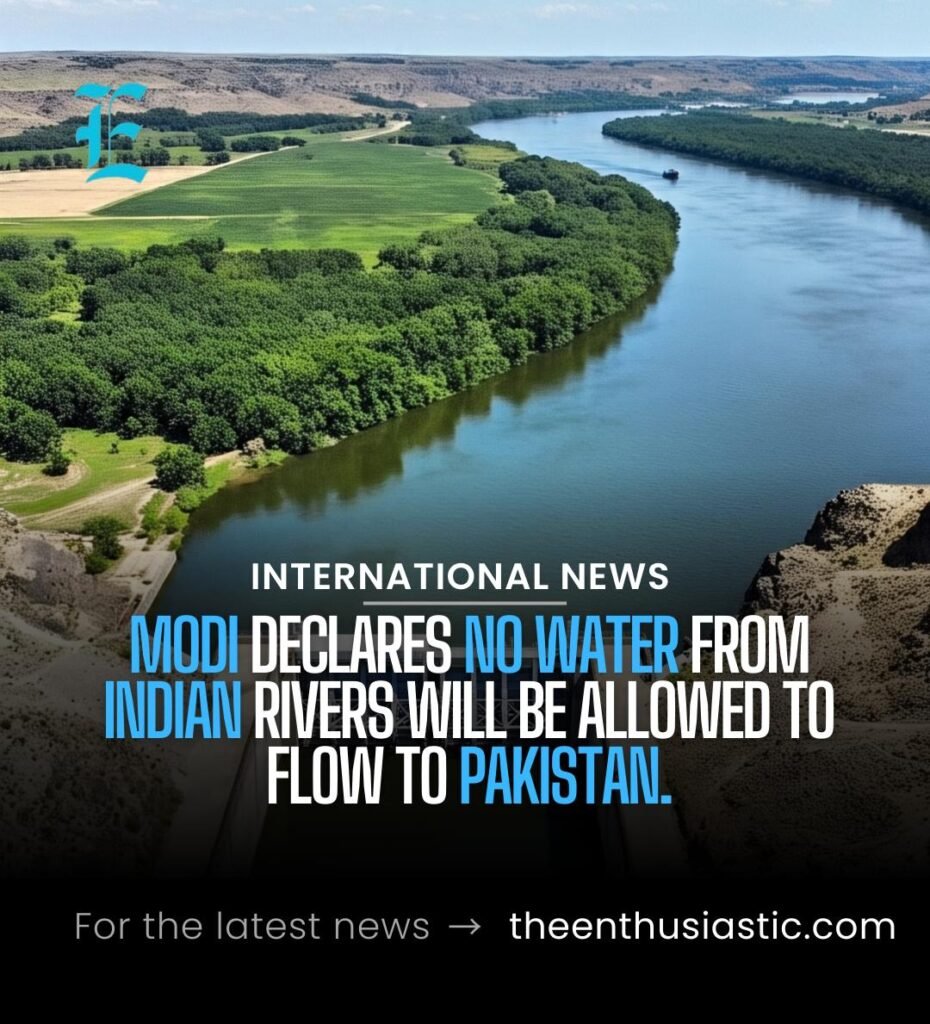Modi Vows to Block Water Flow to Pakistan Amid Rising Tensions Over Kashmir Attack

Table of Contents
New Delhi, May 13, 2025 — Indian Prime Minister Narendra Modi has made a bold declaration that Pakistan will no longer receive water from rivers over which India holds rights, marking a significant escalation in already strained relations between the two nuclear-armed neighbors. The statement was delivered during a public address in Rajasthan on Thursday, following the suspension of the Indus Waters Treaty (IWT) last month by New Delhi.
The treaty, signed in 1960 and brokered by the World Bank, governs the distribution of water from six rivers shared between India and Pakistan. It has long been viewed as a cornerstone of peace in the region, even withstanding multiple wars. Under the treaty, India controls the eastern rivers (Ravi, Beas, Sutlej), while Pakistan has rights over the western rivers (Indus, Jhelum, Chenab). Modi’s declaration now puts the future of this vital agreement in jeopardy.
Context: Kashmir Attack Sparks Retaliation
Tensions surged after a deadly militant attack in Pahalgam, Indian-administered Kashmir, on April 22 that claimed 26 lives. India blamed Pakistan-based groups for orchestrating the attack—a charge Pakistan strongly denies. In response, India not only suspended the IWT but also implemented other retaliatory measures and threatened further action.
“Pakistan will have to pay a heavy price for every terrorist attack,” Modi said in his speech. “Pakistan’s army will pay it, Pakistan’s economy will pay it.”
The two countries came dangerously close to war in the days following the incident, engaging in their most intense military standoff in nearly three decades before reaching a ceasefire agreement on May 10. Indian Foreign Minister Subrahmanyam Jaishankar confirmed that the truce was holding and that both sides had repositioned their forces.
Pakistan Urges Dialogue Within Legal Framework
Reacting to Modi’s remarks, Pakistan’s Attorney General Mansoor Usman Awan reaffirmed Islamabad’s willingness to engage in dialogue over water-sharing issues, but he stressed that any discussions must take place within the framework of the existing treaty.
“The treaty is a binding legal agreement and cannot be suspended or amended unilaterally,” Awan told Reuters. “From Pakistan’s perspective, the treaty remains fully operational and functional.”
He also warned that any unilateral Indian projects on the western rivers—such as hydroelectric dams—would be done “at its own cost and peril.”
Despite the treaty’s suspension, Pakistan’s Finance Minister has downplayed any immediate consequences, stating that the short-term impact on water supplies would be minimal. However, analysts warn that if India proceeds with long-term restrictions, it could severely affect Pakistan’s agricultural sector, which relies on these rivers for 80% of its irrigation needs.
India’s Stance: Clean Energy and Population Demands
India has justified its hardening stance by pointing to growing clean energy needs and rising population pressures. Modi’s administration has previously expressed interest in amending the IWT to allow greater flexibility in harnessing water resources for hydropower and infrastructure development.
Nevertheless, Pakistan insists that any such amendments must be negotiated jointly under the treaty’s dispute resolution mechanisms, and not imposed through unilateral actions.
Outlook: Diplomatic and Environmental Stakes Rise
With water security, regional stability, and agricultural sustainability at stake, international observers are urging both countries to return to the negotiating table. The World Bank, which serves as a neutral party under the IWT, has not yet commented on the recent developments but may be called upon to mediate if tensions escalate further.
The situation remains volatile, and while the ceasefire is currently holding, both sides have made it clear that any future attacks could provoke swift military and diplomatic retaliation.
As India and Pakistan navigate this delicate phase, the fate of a six-decade-old treaty and the livelihoods of millions now hang in the balance.
